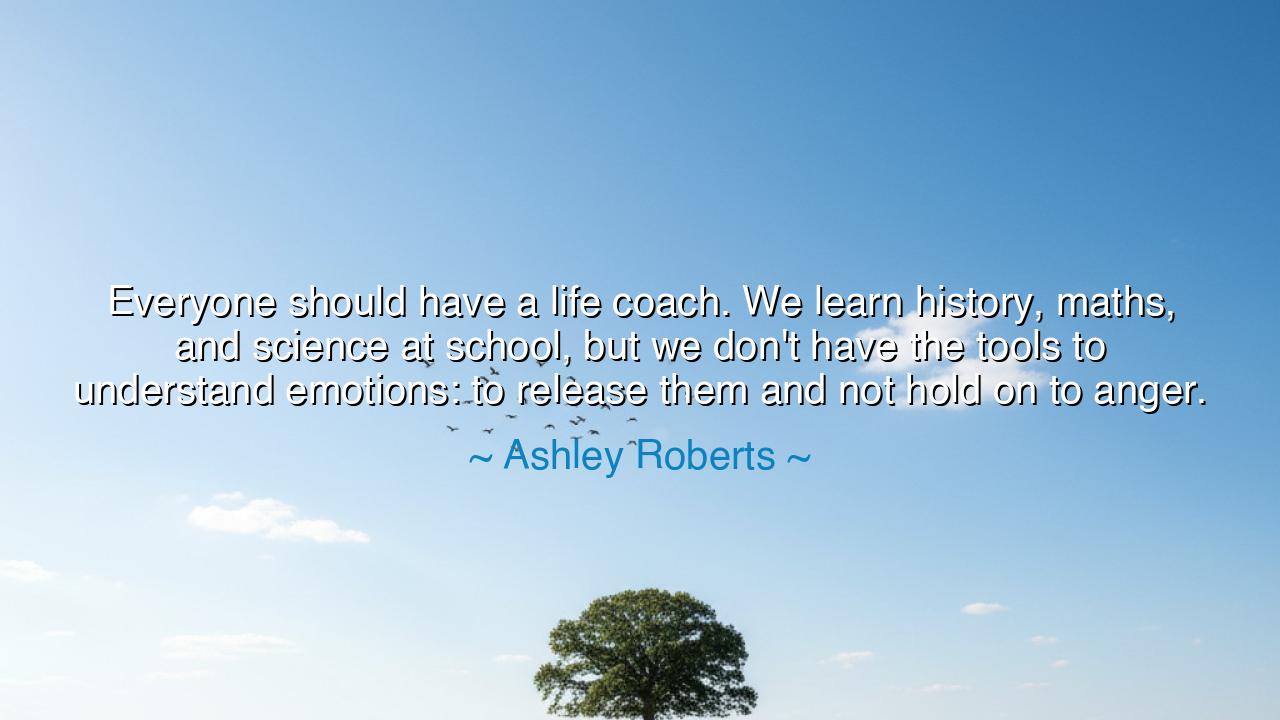
Everyone should have a life coach. We learn history, maths, and
Everyone should have a life coach. We learn history, maths, and science at school, but we don't have the tools to understand emotions: to release them and not hold on to anger.






Host: The calm of the evening settled into the room, creating a reflective space. Jack sat at the table, his fingers resting lightly on his cup, considering Ashley Roberts’s words. Jeeny stood near the window, her gaze directed outward, contemplating the deeper implications of the statement.
Jeeny: “I’ve been thinking about what Ashley Roberts said: ‘Everyone should have a life coach. We learn history, maths, and science at school, but we don’t have the tools to understand emotions: to release them and not hold on to anger.’ It’s such a thought-provoking point, isn’t it? The idea that we’re taught so many academic subjects in school, but we’re not really taught how to manage and understand our emotions—especially things like anger or stress.”
Jack: “Yes, exactly. Roberts is showing us that emotional intelligence is just as important as intellectual knowledge. In school, we’re given the tools to analyze and solve problems in subjects like math or history, but when it comes to dealing with our own feelings, we often don’t receive that kind of structured learning. Anger, frustration, and other intense emotions aren’t things we’re necessarily taught to process in a healthy way. A life coach could help guide us through learning to release those emotions, rather than letting them build up or take control.”
Jeeny: “Right. And I think what Roberts is pointing out is that having emotional tools is essential for overall well-being. It’s one thing to know how to solve an equation, but it’s another thing to know how to manage your emotions when you’re faced with conflict or stress. Life coaches, or anyone who helps guide us in emotional awareness, could teach us how to navigate our feelings in a way that doesn’t result in holding onto things like anger or bitterness. It’s about building resilience and emotional intelligence.”
Host: The stillness in the room deepened as they reflected on the importance of emotional learning, especially in a world where emotions often drive behavior. Jack’s fingers rested on the table, while Jeeny’s expression softened, considering the idea that emotional education can be just as vital as academic education.
Jack: “It makes me think about how emotions—especially negative ones—can affect us long after the event is over. If we don’t have the tools to release or process them, they stay with us, building up over time. And without the guidance of someone who can help us learn how to let go of anger, fear, or frustration, it can be difficult to move forward in a healthy way. A life coach could help teach us how to free ourselves from that emotional baggage.”
Jeeny: “Exactly. And it’s not just about releasing anger, but about understanding the roots of those emotions, learning why we feel a certain way, and using that awareness to guide our responses. We’re so often taught to suppress or ignore our feelings, but what if we could embrace them and learn from them? What if we had the tools to channel anger or frustration in a way that benefits us, rather than letting it control us or poison our well-being?”
Jack: “Right, and I think that’s what makes the idea of a life coach so powerful. It’s not about telling people what to do or think—it’s about teaching them how to tap into their own emotional resources, how to be aware of their feelings, and how to process those feelings in a healthy way. It’s about empowering people to take control of their emotional health, just as we’re taught to take control of our physical health.”
Jeeny: “Yes, and I think Roberts is also highlighting how important it is to create space for emotional growth in our lives. If we start learning how to manage our emotions, to release the negative ones and embrace the positive, we can live a much healthier, more fulfilling life. It’s about building a foundation for emotional well-being that can carry us through life’s challenges.”
Host: The quiet in the room grew deeper, as they both considered how emotional intelligence plays a crucial role in personal growth and well-being. Ashley Roberts had reminded them that, just like academic knowledge, emotional education is vital for leading a balanced, healthy life. Jack leaned back slightly in his chair, while Jeeny’s gaze turned from the window back to him, both of them understanding the importance of learning how to release negative emotions and build emotional resilience.
Jack: “So, Roberts is really showing us that emotional education needs to be just as much a part of our lives as academic education. Learning how to deal with emotions, especially anger, and how to process them healthily, is something that can improve our overall quality of life.”
Jeeny: “Exactly. And it’s a reminder that emotional well-being is a skill we can develop, just like any other. It’s not about ignoring or suppressing emotions—it’s about learning how to process them, understand them, and release them in a way that promotes growth and peace of mind.”
Host: The evening had fully settled in, the quiet understanding between them a reminder that emotional health is just as important as intellectual knowledge. Ashley Roberts had shown them that the tools to understand and process emotions, especially anger, are vital for leading a balanced life. The world outside had darkened, but inside, there was light—a recognition that learning to manage emotions is essential for personal growth and overall well-being.






AAdministratorAdministrator
Welcome, honored guests. Please leave a comment, we will respond soon